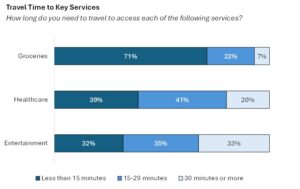By Alex Moore
New data from TSCL’s 2025 Lifestyle Survey suggests that many American seniors live in communities with poor access to key services and community goods. The study, which reported on data from a nationally representative sample of more than 1,200 retirees age 65 or older, shed light on just how far away many American seniors live from basic amenities.
As shown in the chart below, seniors’ communities tend to offer better access to groceries than healthcare or entertainment services. In total, about 71 percent of seniors can get to a grocery store in less than 15 minutes, while another 22 percent can reach one in less than 30 minutes. Only about 8 percent of seniors have to travel more than 30 minutes to reach a grocery store.
Access to healthcare services is a bit more complicated. About 39 percent of seniors can get to at least one healthcare provider, whether that’s in-network or out-of-network, in 15 minutes or less, while another 41 percent can reach one in 30 minutes or less. However, about 20 percent can’t get to medical services in anything less than half an hour. That’s concerning. We estimate that about 11.6 million American retirees live at least 30 minutes from the nearest healthcare provider, or too far for convenient access to services.
Many seniors live even further from entertainment services than healthcare. Only about 32 percent of seniors lived within 15 minutes of entertainment, such as a movie theater, while 35 percent could arrive somewhere fun in half an hour or less. However, that leaves about 33 percent of seniors, or an estimated 18.4 million, who have to travel at least 30 minutes to have some fun.
While it might be easy to dismiss these numbers at first glance, the research shows they’re actually quite important. The 2025 Lifestyle Survey finds that living within 15 minutes of groceries, healthcare, or entertainment has a statistically significant connection to seniors’ overall satisfaction with their current lives, linked to positive feelings like enjoyment, social connection, laughter, and doing interesting things. Likewise, seniors who live 30 minutes or further from each of these services are significantly less likely to report high life satisfaction, with higher rates of negative feelings such as worry, anger, or sadness.


